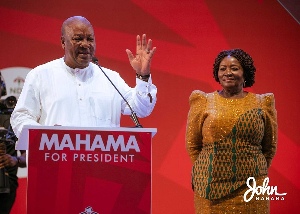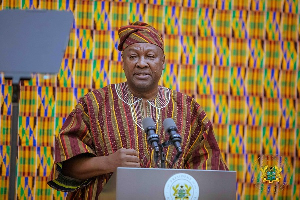Hello Osagyefo,
?Kpoi, Kpoi, Kpoi, woyo woyo woi? My paddy, mentelle wo anaa de menblow wo, ?Obaawo?. Is there anyone out there who is not a fan of music? I was just thinking about that the other day. No one will mistake my name for an American, I hope not, because my roots are from that blessed land that was formerly called the Gold Coast. I love music and I love Ghanaian music. I will proceed to tell you why.
?Enyom no (the song)?? enti shake shake?..wo ne wo dofo nni asa a?. Will anyone mistake Makola Kwaku (ei) for a madman if he dances the Zaaza or Suudwe at Circle? I hope not. ?Asa a abaso nie?, so brothers and sisters, Monfa sa, because you know what, Ahomka womu. Isn?t it a shame most of us call ourselves Ghanaians yet can hardly read or write a Ghanaian language?
Yeah, we always have to wait for others to take interest in our affairs and then get surprised, as in when Google comes up with a TWI version. Did I hear you say, ?Huh?? Well, kill your curiosity here: http://www.google.com/intl/tw/ .
Ghanaian music touches a various scope of issues. Lord Kenya has an obsession with money, he has had storylines of money in every album. As for the money, u no dey on some a, then money can take himself. It doesn?t get better than this. I guess I can go on to say, ?as for the money, if u dey on some, then u for search am plenty?. Yeesom sika ampa.
Omanhene Pozoh?s ?Anhia me? talked about the fact that you could have the money but when the bee begins to sting, you can?t help it being stingy. When you don?t have enough cash to spend, you don?t spend it. ?Kurom beye wo de a, efiri wo botom?. Osagyefo, most of the banks in Ghana have begun issuing debit cards and a fair amount of supermarkets and retail outlets accept the ?plastic? money. I was enthralled to see this new development. However, you are holding the ?Sika? card, but life is still hard?.
There are cards and there are cards. Has anyone realized that this development is helping the rich become richer and the poor is falling farther behind? Whoever is in chare of Adult Education, should help educate people about this secure way to carry money around and measures must be put in place to improve its marketability. HIPC or no HIPC.
When women see men, they start shaking their behinds, credit Omanhene Pozoh. When men see women, their foolishness becomes evident, credit someone who remixed Pozoh?s popular song called Woasei. You may have your doubts about the validity of such statements, but there is an amount of truth in them. Castro?s ?Sradenam? is to Jay Q?s ?For the Road? (Driver), as Okomfo?s Boys Boys is to Triple M?s Girls Girls.
There is so much unemployment in Ghana that the number of Abuskeleke Alelekenkele on our streets is an eyesore. The world isn?t the same place it was in the ?Forwards ever, backwards never? days, my friend. Travller John must have known that two words like ?Asee Ho? would go down very well with his fellow citizens for him to employ them in his 2000 election campaign. Well, Mr. Borax saw an opening and entertained us the next year with a song entitled Asee Ho. The criticism that followed reached ?Aben wo aha? proportions.
Sure, it is not entirely wrong to produce music of this calibre, there are Atia Donkos and lovers of Atia Donkos amongst the audience. A proper and effective system of selectiveness and morality must reign in us as children, youth and adults to throw garbage away from what we need to hear and follow.
Nananom Sidney dubbed himself ?controversial first class? after releasing Scent No to follow his critically acclaimed Abuskeleke. It had a catchy phrase and the NPP and NDC are fighting to put ?Scent no, agye beebbeaaa? in their election campaigns. Are Ghanaians smart or what? If you listen to the song, it does have a message. Cleanliness they say is next to Godliness. Enough said. ?Feemo le zu zu, feemo le ugaga?, can anyone tell me what this means? King David?s ?Aayefe Notse? was a hit and it carries an equally good message.
It is funny how the others get credit for the energy and effort some people put into a venture, but frankly speaking, it is not something that should be encouraged. A lot of Ghanaian youth have started abusing alcohol maybe too early and whether it is Ginseng, Alomo or ABC (of love), the response is still Bubra. No one can doubt the impact of music, but we need to train the children the ways they should go, because when they are old they will not depart from it.
?Gbeepi Akle, Ghana lady na ereba no?. Can we all hold one leg up to remember Terry Bonchaka? He was a revolutionary in his profession. When others were having trouble keeping their trousers from falling onstage and tying their bandanas, he was like, ?Maaso menhye bi? (Respecting the Ghanaian efforts at clothing). Musicians have not lost sight of the need to encourage our citizenry to be patriotic and disciplined. Obrafour?s Nya ntitie Pa, Kwame Nkrumah (Yeah, Osagyefo, a tribute to you) and Obibini, as well as Nananom?s U Go Say and Nat Brew?s Wogbe are a few songs that encourage us to have the good of our nation in our thoughts.
I am not forgetting the many patriotic songs like Yen Ara Asase Ni that have remained very much in our culture. It probably is only seen as a formality these days, something that is sung once in a while, because it has become part of our calendars and not our time.
When a group of Ghanaian artistes collaborated to produce a song that educated the nation about AIDS, it received some good publicity. Similar efforts followed concerning restoring and maintaining peace in Dagbon as well as supporting the anti-indiscipline campaign initiated by the incumbent Vice President, Aliu Mahama. We need more of these efforts. ?Okomfo re kom, monye komm, AIDS reku yen domm??Obiara nhye condom?. If you can?t understand the words that are coming out of my mouth, don?t worry but I am sure two words struck you: AIDS and condom.
AIDS is a sad disease plaguing the better part of Africa. Maybe this is what you need to hear, it kills almost 7,000 Africans every day. Think about it, Osagyefo, by the time you decide to write back to me, many people will have lost their lives. We have to start doing anything about this something. Especially the way people are listening to Koyonso and Mete Wote more than the patriotic and risky efforts in producing music to spur and stir patriotism, selflessness and discipline in our lives.
Some people share the opinion that Hiplife music is noise, music that?s not here to stay and music that?s going nowhere. People are making a genuine effort to sell music and carry messages into the market. It?s true that some of the music is not original, nothing new and just there for music?s sake. It?s very easy to explain this. When we respect the music of others, foreign music that tickles our fancy mainly because it?s a language many people happen to speak, how can we not find ways to fault our own ingenuity and effort? A prophet is hardly welcomed in his own land.
Hiplife music is here to stay and as we continue to educate the musicians on the real needs of the people, we must enjoy what we have come up with. Keep your eyes on the road my friends for it is one of the ways home. If we do not believe in the things we can come up with, we surely aren?t going anywhere.
I also admire the efforts and the genres of highlife, reggae, krisskross music (Ghanafuo beku yen) and you can?t underestimate the impact of gospel music. If we all do not make a concerted effort to promote our music, it will not go anywhere. Twi, Fante, Ga and Dagbani are not worldly languages. They have minimal markets. However, I can pinpoint the Koffi Olomides, the Youssou Ndours and the Angelique Kidjos who are doing well in the world markets.
We need record companies to help promote our music worldwide. Our music is Ghanaian as it is and to make way for the uncontrollable urge of bowing to the popular Western culture, we have manufactured hiplife and its similar genres. How bad can our music be? Our music is here to stay. It is part and parcel of what we do and should be doing. What we should be doing comes from various sources and one of those is life-changing-for-the-better music.
Who Jah bless, no one curse, (the last two).












